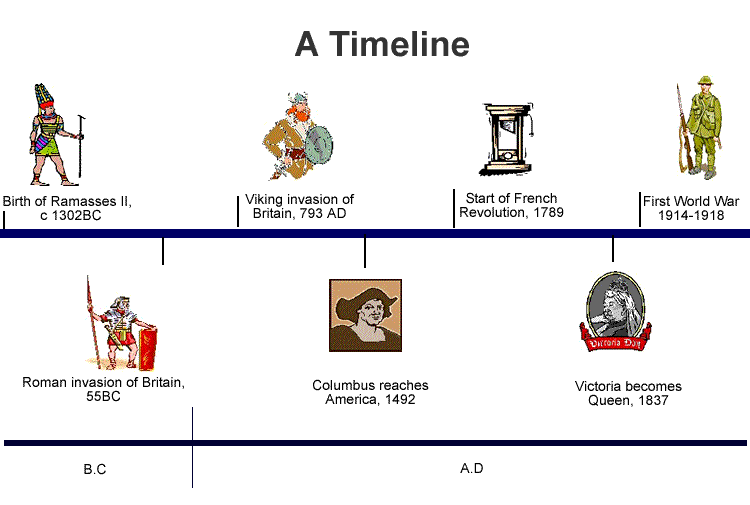
Timelines
Chronology or putting things in the right order is very important in history. Can you imagine how confused you would be if you didn’t know that the Romans arrived in Britain before William the Conquerer or that Queen Victoria came to the throne after Queen Elizabeth I? This is why dates are so important to the study of history. The most commonly used system of dating things in history is the one which we use every day that is based on the Gregorian Calendar.
The Gregorian Calendar was named after Pope Gregory XIII who ordered its adoption in 1582. Under the Gregorian Calendar the year is divided into 365 (or 366 in a leap year) days which are then grouped into twelve months. The years are numbered according to the year in which Christ was believed to have been born. The period before that is known as B.C. (short for Before Christ) and the years after are known as A.D (short Anno Domini, and meaning the Year of our Lord). What can make this system confusing is that events in the B.C. era are dated in descending order, whilst those in the A.D. era happen in ascending order. Have a look at the timeline (not to scale) below to see how this works.

Not all countries adopted the Gregorian Calendar immediately. Some countries objected because it was a Catholic invention. Britain (and her Empire) did not adopt the calendar until 1752, Russia adopted it in 1918 and Greece waited until 1923!
The other thing to remember about timelines in history is to be careful when talking about centuries. The century is always bigger than the actual date. For example, the War of the Roses took place between 1455 and 1487 – this was in the fifteenth century, the Battle of Waterloo took place 1815 – this was in the nineteenth century. One way of remembering it is to think about your birthday. When you are 12, you have been alive for 12 years and are now in your 13th year.
Got it sorted? Then why not test your knowledge of time in history by trying out this mini-quiz.
How did you do? If you feel as though you have mastered timelines then move on to find out about anachronisms.